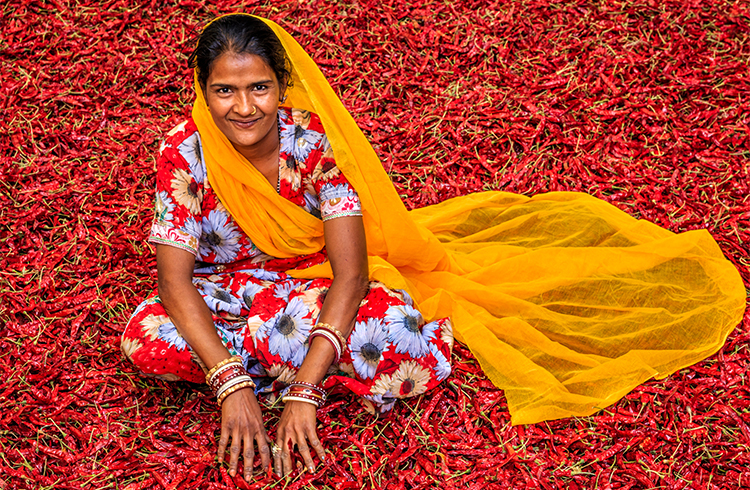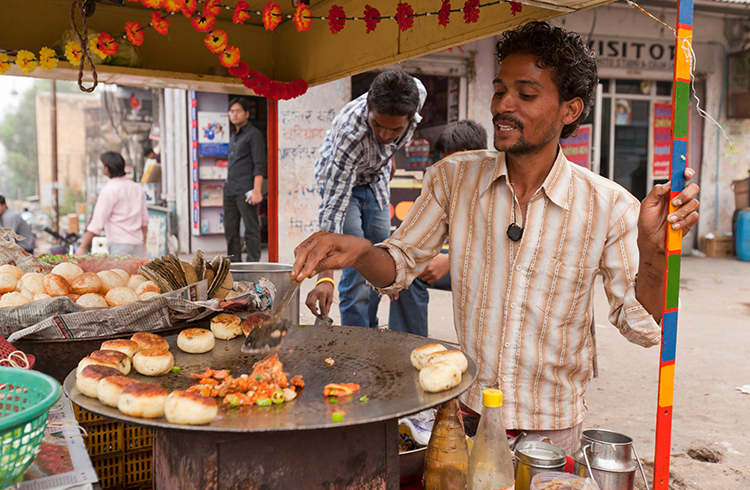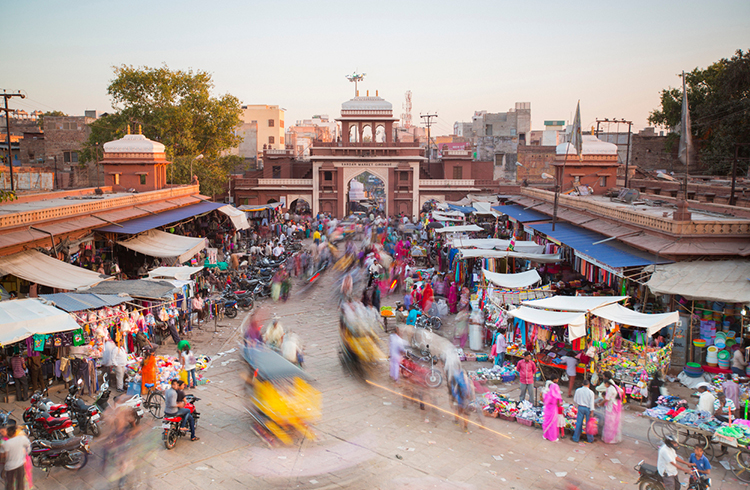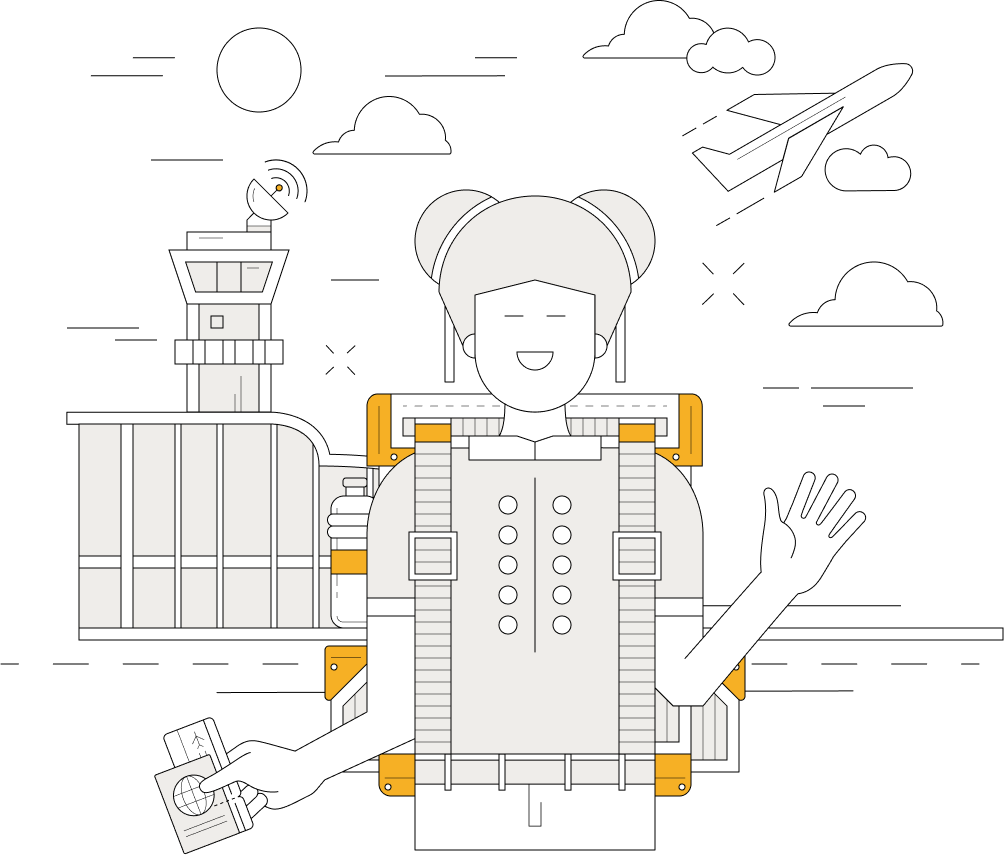Travel insurance for India
Spirituality, cacophony and colour
- Trusted by:
Trusted by:
Essential travel insurance tips for travelling through India
India is a destination like nowhere else in the world. Steeped in sacred tradition, ablaze with colour, and emanating a culinary aroma all its own - the moment you step off the plane in India your entire being is enraptured. But just because a country has captured your heart and soul doesn’t mean a jaunt through its wonders will come hassle free.
- Culinary delight or medical emergency?
- How can World Nomads’ travel insurance help with Delhi belly?
- Lightening your load… and your valuables
- Consider protecting yourself and your gear
- Steer clear of scams
- Hidden treasure or dangerous conflict zone?
- Frequently asked questions
Keep the harmony in balance with these essential tips that can help us help you if ever the need arises.

Culinary delight or medical emergency?
So you’ve arrived in India, homeland of tikka, korma, and madras curry. There’s just one little thing lurking, ready to knock you and your travel plans off their feet… gastro!
Otherwise known as “Rangoon runs,” “Delhi belly”, or just plain diarrhea, it singlehandedly derails more Nomads’ trips to the Taj than any other insurance claim in India. Many Nomads have experienced gastro before and know the standard precautions to take: check the seals on bottles, wash your hands, and only eat steaming hot food that’s cooked in front of you.
What you may not be ready for is the impact of a full-blown episode of authentic, Indian-food inspired gastro that scoffs at the western medicine you may have in your backpack and throws it back in your face… literally. Indian gastro typically hangs around a lot longer than you might expect if not treated with the right medication early. Combine that with the often-unrelenting heat of an Indian summer, and dehydration can leave you very ill.
To find out more about what you may be covered for when it comes to health emergencies check out our travel health article.

How can World Nomads’ travel insurance help with Delhi belly?
We recommend travelers with a World Nomads policy contact us earlier rather than later if they get a bout of gastro in India – we really don’t want you to miss seeing the Taj or, even worse, your connecting flight to your next destination.
A local operator can help you place a reverse charge call to our 24-hour, 7 days a week team who are trained to deal with these situations, or you can look to claim back the cost of the call later. We’ll be able to give you info on what to do next, help locate local suitable medical facilities where you can be seen by a medical professional who can prescribe antibiotics or other medication and, if necessary, arrange hospitalization depending on the severity of your gastro.
Policies vary depending on your Country of Residence and which plan you’ve chosen. Cover can include emergency local medical expenses and the costs of your trip being interrupted if the furthest you’re able to travel is to the toilet and back.
Find out how to (try to..) avoid Delhi belly and stay healthy while in India with these top tips.
Lightening your load… and your valuables
Before you hop on that 15-hour Mumbai to Goa bus, there are some things you need to know, because if you don’t take the right precautions, your policy may not cover you for theft. Cover varies depending on the plan you’ve chosen and your Country of Residence (so make sure you read the policy terms and conditions), but generally, travelers must be able to show they took “reasonable care” to protect their valuables.
In India, this means if you leave your bags where they might be rifled through – such as at your feet on a busy bus, in the train baggage compartment or with people you’ve only just met – you may not be covered. Beautiful India… gorgeous, exotic, stunning and oh so dangerous for the unprepared. Before you head off on the Spice Trail, here are the top 3 tips to help protect yourself and your gear.
Consider protecting yourself and your gear
If your country’s government advice is to not travel to a particular area in India, your travel insurance can be void if you book or travel there. Lock your luggage and use under-clothing wallet holders for important documents, passport, and credit cards, with a small amount of rupee on hand for the journey’s expenses. Take turns sleeping on public transport, never leave your bags unattended or with someone you’ve just met, and always stay aware.
One of our Nomads reported having his bag stolen from under his sleeping head, so if it’s not zipped in, padlocked, and secured out of sight, you may lose it. Before you travel, make sure you have receipts for your valuables, and keep your passport, bank details, and photocopies throughout your bags. You will need a police report to claim, and even though those local Indian police stations can be frustrating to deal with. Do try to get something in writing and document everything you do – the more information you can provide with your claim, the better.
Steer clear of scams
Like pickpockets, scams are rife in India. The good news is if you know how to spot a scam before you go, you’re less likely to fall victim to the often-convincing trap of a scam.
Places like tourist attractions, train stations, and bustling streets are a free for all peppered with dodgy scammers on the lookout for fresh travelers. This article on ‘How to Avoid Common Scams When Traveling in India’ is a good place to become acquainted with how to spot a scam when you’re presented with one. But if there’s a key takeaway it’s reminding yourself if it sounds too good to be true, it is.

Hidden treasure or dangerous conflict zone?
If you want to go off-the-beaten-track in India, you really need to do your research first to ensure you’re not going to void your travel insurance, or worse, end up in jail, injured, or dead.
As they’re often disputed and unmarked, borders between India and its neighbors can be particularly risky to travel to.
If your country’s government advice is to not travel to a particular area in India, your travel insurance can be void if you book or travel there, intentionally putting yourself in harm’s way. Common areas that many countries recommend you do not travel to in India include:
- In the north: the areas of Jammu, Kashmir and Srinagar (including Gulmarg, Pahalgam, and Sonamarg) experience sporadic terrorist activity and violent demonstrations, which travelers might get caught up in.
- To the west: various warnings exist for the immediate vicinity of the border with Pakistan in the states of Gujarat, Rajasthan and Punjab due to landmines and unexploded ordnance.
- To the east: areas in Assam bordering Bangladesh, and areas in Manipur and Nagaland bordering Myanmar may be “No Travel” areas due to the risk of insurgency.
Encountering mishap while on the road is never fun, and even worse, with void travel insurance, if anything goes wrong, you’re entirely on your own.
Always check your insurance policy and your government’s current list of travel warnings before you book your travel to India. World Health Organization can also provide the latest updates for travelers headed to India. If you’re not sure, contact us.
All of the information we provide about travel insurance is a brief summary only. It does not include all terms, conditions, limitations, exclusions and termination provisions of the travel insurance plans described. Coverage may not be available for residents of all countries, states or provinces.
Ready to go? Get a quote.
Tell us your travel details below and get a quote for your trip. You’ll be reveling in the heady din of India in no time.
Frequently asked questions
Can I drink the water in India?
This is a firm no. Tap water in India is not safe for drinking, brushing your teeth, or slurping in the shower. It’s also advisable to stay away from foods that may have been washed with tap water, such as lettuce and other salad items. A good rule of thumb is if it’s not cooked or peeled it’s not safe. And don’t forget to say ‘no thanks’ to ice cubes in your drink - they’ve been made from tap water.
What vaccines do I need when traveling to India?
While no specific vaccination is required to enter the country—unless you’re traveling to India from a yellow fever affected region—most home countries will recommend some vaccinations. These typically include Hepatitis A and B, typhoid, and meningitis. Speak to your medical provider well in advance of your trip to ensure you’re properly covered.
Is malaria an issue in India?
Yes, malaria continues to be an issue throughout India. While the risk of contracting malaria in areas such as Delhi is lower, it’s still possible. Seek out medical advice before traveling to India to ensure you’re protected from malaria while overseas.
About World Nomads
World Nomads polices are designed by travelers for travelers to provide simple and flexible travel insurance. Featuring coverage for more than 150 activities, you can get a quote, claim, or extend your policy online at www.worldnomads.com. All the information we provide about travel insurance is a brief summary only. It does not include all terms, conditions, limitations, exclusions and termination provisions of the travel insurance plans described. Coverage may not be available for residents of all countries, states or provinces. Please carefully read your policy wording for a full description of coverage.
Traveler tip: your exact coverage benefits will depend on your Country of Residence and the plan you select, each with different policy benefits and limits to cover. Make sure you read your World Nomads policy, which explains in more detail the types of situations that are and are not covered.
Travel Insurance Benefits: how we can take care of you*
Trip Cancellation
Been working hard for your trip?
We'll work hard to protect it.
Trip Protection
- Unexpectedly hospitalised?
- Travel buddy unfit to travel?
- Close relative suddenly dies?
We’ve got your back.
Emergency Medical Expenses
Feeling fit and healthy? What if you get sick or injured?
Take the pain out of medical or dental costs.
Emergency Medical Insurance
- Need meds quick?
- Accidentally injured?
- Suddenly sick?
We’ve got your back.
Emergency Medical Transportation
Know where the nearest hospital is?
Don’t stress, we’ll get you there quickly.
Evacuation and Repatriation
- Banged up abroad?
- Need a hospital urgently?
- Medivac home?
Help starts here.
Protect your gear
Love photography, filming or sport?
Cover your bags, tech or gear.
Protect your gear
- Passport or tech stolen?
- Airline lost your gear?
- Bags delayed?
Help starts here.
- Emergency Overseas Medical & Dental Expenses
- Emergency Medical Evacuation & Repatriation
- Trip Cancellation or Interruption
- 24-Hour Assistance Services
- Baggage
- And more (depending on your country of residence)
24/7 emergency assistance
Whether you need medical assistance or emergency evacuation, our teams are available 24 hours a day, 7 days a week, 365 days a year before and during your trip.
Are you in need of emergency assistance right now?
Contact the teamBefore your trip, check the latest government advice for any travel alerts for your destination.
